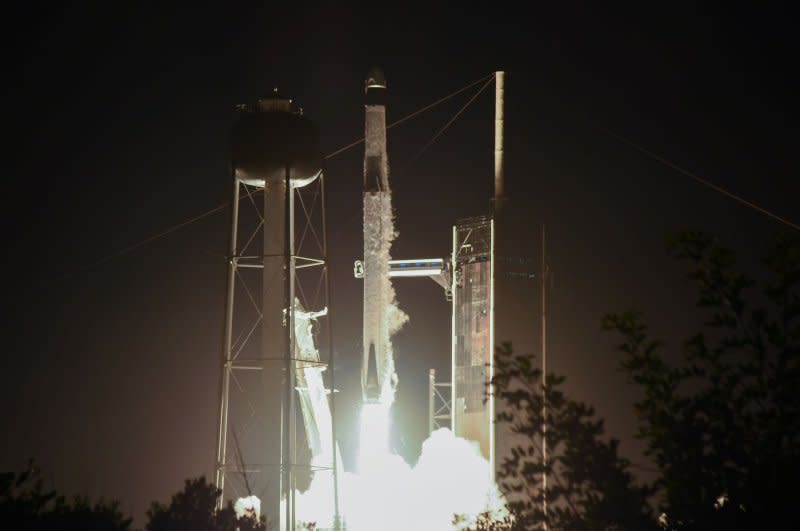NASA's SpaceX Crew-7 successfully docks with International Space Station

Aug. 27 (UPI) -- NASA's SpaceX Crew-7 mission successfully docked with the International Space Station on Sunday.
The docking maneuver occurred at 9:16 a.m. EDT, a critical phase of yet another mission partnership between the federal space agency NASA and SpaceX -- the company led by controversial billionaire Elon Musk.
The hatch was opened and the crew members made their way onto the space station around 10:58 a.m. during which the astronauts would make their way into the space station to join the current ISS crew.
"We'll get to see them and hear their first remarks about their visit to the space station, maybe what the ride was like," NASA commentator Leah Cheshier said ahead of the hatch opening. "Then they will move right into work."
The welcoming ceremony was held just before 11:30 a.m. after everyone got settled onto the ISS.

American Jasmin Moghbeli of NASA said it was good to see the "smiling faces" of the previous crew members and looked forward to continuing their work.
"We hope that you teach us how to do things efficiently and effectively and we're proud to join this team," she said.
The Crew-7 mission, aboard the SpaceX Crew Dragon spacecraft named "Endurance," was launched from Kennedy Space Center in Florida on Saturday.
The mission bears the SpaceX name because the company designed the spacecraft carrying out the mission. The federal government has poured massive sums of money into Musk's company.
The crew also includes Andreas Mogensen of the European Space Agency, Satoshi Furukawa of Japan Aerospace Exploration Agency and Konstantin Borisov of Russia's Roscosmos space agency.
They will spend six months aboard the space station.
Onboard the ISS, the astronauts will carry out a range of scientific experiments, technology demonstrations, research and maintenance tasks.
The journey to the ISS was characterized by a series of precisely timed orbital maneuvers that positioned the spacecraft for a seamless rendezvous with the space station.
The Crew Dragon's automated docking system, equipped with cutting-edge sensors and AI-driven algorithms, guided the spacecraft to a gentle connection with the ISS's docking port.
"Slow and steady wins the race when it comes to bringing two spacecraft together. The docking procedures require really a great deal of precision to make sure we are keeping the spacecraft and obviously the crew safe," Cheshier said in the broadcast of the operation.
NASA and SpaceX mission control teams closely monitored the entire docking process.
Following the docking, the crew initiated the necessary procedures to establish a secure and airtight connection between the Crew Dragon and the ISS.
The Crew Dragon capsule that is part of this mission previously flew NASA's Crew-3 and Crew-5 missions to and from the space station. The stage 1 booster stage of the Falcon rocket was jettisoned about 9 minutes after lift-off and came back to Earth at Landing Zone 1 at Cape Canaveral Space Force Station.
Aboard the space station, the new group will join the SpaceX Crew-6 astronauts, NASA's Stephen Bowen and Warren Hoburg, the United Arab Emirates' Sultan Alneyadi and Roscosmos' Andrey Fedyaev -- set to return to Earth aboard Dragon Endurance on Sept. 2.
Also aboard are Sergey Prokopyev, Dmitry Petelin and Francisco Rubio from Roscosmos' MS-22 mission, who are in their 10th month on the space station.

